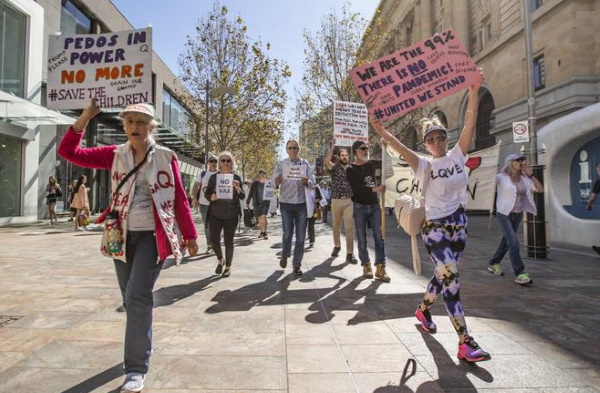345. Personal freedom versus the public good
Most people accept that it is appropriate for governments to impose restrictions on us to reduce illness and loss of life due to COVID-19. But some people don’t accept the resulting reductions in their freedom. What does economics say about this?
At the height of the first wave of COVID-19 in the US, I watched a news report about a protest against the restrictions being imposed. A protester told the reporter that she was not prepared to sacrifice her personal freedoms in order to “save a few tens of thousands of lives”.
She certainly demonstrated a clear understanding of one aspect of the policy response to COVID: we can reduce the health and mortality costs of COVID, but it requires us to bear other costs, including reductions in our freedoms. Or we can stay free of COVID restrictions but it comes at the cost of ill-health and mortality for others. It’s a trade-off.

Economists have a word for the situation where a person’s free choice has impacts on others, and those impacts are not taken into account by the original person: “externalities”. The study of externalities is central to environmental economics (e.g. the economics of pollution), the economics of spreading agricultural pests and diseases, and the economics of contagious diseases.
Some of those protesting against COVID-related restrictions, like the woman I mentioned earlier, seem to be arguing that their personal freedom is almost infinitely valuable. I’m not saying they all do. Some clearly are thinking about the trade-offs. But some speak as if there is no trade-off that they would be prepared to make.
If they would agree to a serious conversation, I hope they’d come to appreciate that the logical implications of their freedom-at-any-cost position make it untenable. Would they support decriminalisation of murder or rape? The laws against murder and rape are clearly restrictions on our freedoms. They are restrictions that have large benefits, but there is no denying that they involve losses of freedom to people who would otherwise choose to murder or rape people. If we valued personal freedom far above all other considerations, we might choose to get rid of these legal restrictions.
But then again, what about the freedom of the victims to live their lives without being murdered or raped? Or the freedom of people affected by pollution to be free of that pollution? When you think about it this way, you can see that, in a situation like this, it is impossible for everybody to have all of their desired freedoms satisfied. The government could give industry the right to pollute, or it could give the public the right to clean air, but it can’t do both.
A similar symmetry is in place when considering COVID-19 restrictions. A government can give their people the right to go maskless or to attend large public events, but in doing so they are discounting potential rights of people to be free of the disease.
If you argue for the right to behave however you like in the name of personal freedom, you are arguing that your rights are more important than those of the other people who will be affected as a result of your behaviour. You might prefer for your rights to be given precedence over other peoples’, but as a general principle for government policies, that’s obviously impossible to defend. Only dictators get that option.
The recognition that this issue is about rights, and that there are two sides to the debate over whose rights should prevail, was an important insight in economics and helped us to progress our ideas about policy in various ways. It won a Nobel Prize for Ronald Coase. He helped us see that governments have a key role in specifying and defending rights. Unless a solution can easily be negotiated between people, governments also need to carefully consider who they allocate the rights to. As part of that, they need to weigh up the benefits and costs of different policy strategies, such as different restrictions to combat COVID.
If we seek the greatest net benefits overall, then it is possible for the best solution to lie anywhere along the spectrum, from very high restrictions to none at all. For example, when there is a cold going around, it clearly would not be optimal to impose a strict months-long lockdown to reduce its spread. We would just hope that people behave sensibly. On the other hand, if there is a pandemic with high mortality and morbidity and high rates of infection, it could well be in the best interests of the community as a whole to impose a strong lockdown for a while.
An intensive, costly strategy, like a lockdown, is much more likely to be worthwhile if the strategy results in complete eradication of the disease. For COVID, the benefits of complete eradication (as in New Zealand and Western Australia) are so enormous that I think they tip the balance decisively in favour of the strategy described by local politicians as “go hard, go early”.
If the disease has spread so far that eradication is now infeasible (until there is an effective vaccine), various restrictions may still have benefits greater than costs, but it’s not such an overwhelming case as it is when eradication is likely.
It is interesting that complainers against COVID-related restrictions exist even in places where those restrictions have been spectacularly successful. To argue that New Zealand and Western Australia would have been better off without their restrictions is plain stupid, but some people do.

Of course, the overwhelming majority of people who live in those places appreciate how lucky they are to live where they do, and public approval of their governments’ COVID policies has been sky high throughout.
To get back to my main point, it is that invoking your rights to freedom as an argument against COVID restrictions is a completely unpersuasive argument. Responsible government is about balancing competing rights by weighing up the benefits and costs of different courses of action.
Further reading
Coase, R.H. (1960). “The Problem of Social Cost”, Journal of Law and Economics, The University of Chicago Press, Vol. 3 (Oct., 1960): 1–44. Full paper.
David,
Many thanks for this clear analysis of the economics of personal freedom vs the public good during the current pandemic. The same line of argument can be advanced in the case of vaccination. I recall, as an economics student many years ago, that vaccination was a good example of a public good in that vaccinated individuals conferred a positive externality on others through reducing the spread of disease – and vice versa. Of course, the arguments for such restrictions as weraring face masks in the current pandemic are also expressed as moral imperatives and public responsibility (“your freedom to cough and sneeze stops at my nose”). I believe that your explanation deserves a much wider audiece and circulation than Pannell Discussions. Have you considered that, and allowing it to be distributed among our networks?
Hi Wilfrid. I will think about other channels. Very happy for others to distribute it. Cheers
Dave
Nice piece Dave!
Thanks for an interesting piece and useful perspective, David.
You say: ‘A protester told the reporter that she was not prepared to sacrifice her personal freedoms in order to “save a few tens of thousands of lives”.’
A reasonable question for this protester would be: Is she prepared to sacrifice some of her freedoms if one of those ‘few tens of thousands of lives’ was her child or mother?
Where does she draw the boundary of her position? Does she have a boundary? And is she a ‘freeloader’?
Thanks Dave. When I was in high school civics class, we were told that rights go along with responsibilities. It seems that linkage has gotten lost. Laura
David
As usual well considered and informative for the non economists in the world
Thank you
PS i like the new banner and presentation!
Thanks Lucinda. It’s actually a random banner, selected from a set of about 6. I hope you like the other ones too.
A good article Dave. I agree with your argument in terms of the tradeoff between personal freedom and public good. There is a clear limit to personal freedoms.
The tradeoff between economic (i.e. business) damage and public health when it comes to lockdowns I find trickier. For example, could you get a higher net benefit by putting in place measures specifically aimed at protecting the vulnerable as opposed to a complete lockdown which has major business implications? Free flu vaccinations for the elderly is an existing example.
My concern about the current policy approach is that there seems to be no endgame in sight yet. Even with a vaccine (which I fear many will not take unless it is compulsory), the virus is likely to be circulating in the nation for years, even decades. Do states invoke an economically damaging lockdown if there is 1 new case? 5 new cases? 10 new cases?
And of course (like most policy these days) media sentiment is likely to have a large impact on that decision.
When do governments have to throw the doors open and say ‘you now have to take your chances’?
Seems to be begging for a good BCA….which will lead you down the murky path of valuing human life (been there).
Hi David. There is quite a bit of that type of research going on. You might enjoy exploring the COVID Economics web site: https://cepr.org/content/covid-economics-vetted-and-real-time-papers-0
Political philosophy is even clearer. Liberal political morality extends personal freedom to the point where it starts to harm others. John Stuart Mill’s On Liberty etc.
Thanks Chrissy. Coase’s additional insight is that it’s not just a one-way thing. If a particular political morality gives the rights to group A, group B suffers, while if a different political morality gives the rights to group B, group A suffers. Makes it clear that a judgment call is required, preferably based on some careful analysis of the conflicting costs and benefits. Cheers Dave
Thanks David,
A great and interesting piece and a much appreciated link to Course’s. I wish I had read it sooner (although it could have used a good edit). A question: is this the start of the beneficiary pays principle? Thanks again, Michael
Thanks Michael. I’d be interested to know what your suggested edits are. (By the way, I think you mean “I” instead of “a”, and “courses” should not have a capital or an apostrophe, and you need a hyphen in beneficiary-pays.) 🙂
No, this is not an argument in favour of the beneficiary-pays principle (if that’s what you mean). The insights in this post mean that the beneficiary-pays principle and the polluter-pays principle are not really principles at all, just rules of thumb about how the rights should be allocated. Policy makers still have to decide which of those rules of thumb they prefer (if any). See Pannell Discussion #21 for more on this.
Thanks David. I meant Coase’s paper (i.e. Coase 1960) not your course or anyone else’s. Entirely my problem, writing course and not Coase. The edits would be to Coase (1960) – 40 odd pages long – not your blog. Plenty of examples in Coase (1960), but the key point is well made in the first few pages with the example of the grain farmer and the cattle rancher. My thinking has been along the lines of an analogy with payments for ecosystem services. Also relevant is your blog and paper on transaction costs, an issue that Coase discusses: https://www.pannelldiscussions.net/2011/08/192-transaction-costs/
Thanks again, Michael
Oh, I see. Yes, it’s rather long.